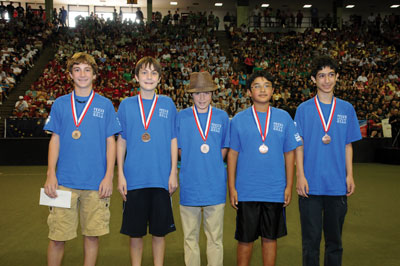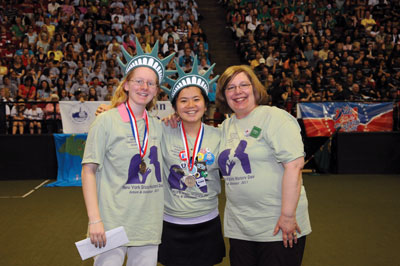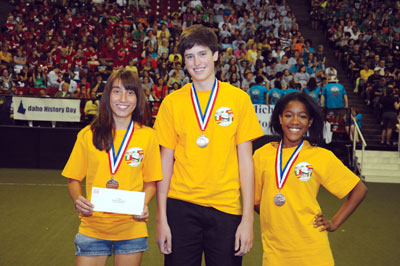 National History Day is more than a day. It is an academic competition designed to teach students at both the elementary and secondary levels to think critically about historical topics related to a theme, and to conduct primary and secondary research. Students are grouped as either juniors or seniors and those who make it past the local and state levels then get to compete in the national finals, which are held over five days on the campus of the University of Maryland at College Park. This year’s National History Day focused on the theme “Debate and Diplomacy in History,” and the finals lasted from Sunday, June 12 through Thursday, June 16, 2011. The winners received their awards in a ceremony that was also broadcast live through the History Channel’s web site (which can be viewed at www.history.com/shows/classroom/articles/classroom-whats-new). For a complete list of the winners, visit the National History Day contest winner’s page at www.nhd.org/AwardsWinners.htm.
National History Day is more than a day. It is an academic competition designed to teach students at both the elementary and secondary levels to think critically about historical topics related to a theme, and to conduct primary and secondary research. Students are grouped as either juniors or seniors and those who make it past the local and state levels then get to compete in the national finals, which are held over five days on the campus of the University of Maryland at College Park. This year’s National History Day focused on the theme “Debate and Diplomacy in History,” and the finals lasted from Sunday, June 12 through Thursday, June 16, 2011. The winners received their awards in a ceremony that was also broadcast live through the History Channel’s web site (which can be viewed at www.history.com/shows/classroom/articles/classroom-whats-new). For a complete list of the winners, visit the National History Day contest winner’s page at www.nhd.org/AwardsWinners.htm.
One of the more interesting aspects of the National History Day competition is that anyone in the historical profession can participate as a judge. I have been a History Day judge—off-and-on—for the past eight years, and when I'm available, it's something that I really enjoy doing. I received advanced training in history and keep up with my interest, but I am not a teacher. I work as a print editor/designer. History Day judging gives me the opportunity—brief as it is—to share my knowledge of history directly with students and to possibly even influence their perceptions of, and interest in, the discipline/subject as well.
 This year’s competition seemed to illustrate this quality to me more so than from years past, perhaps. I was surprised to find that at least one-third of the 40-or-so students that my group interviewed seemed genuinely engaged with their topic and interested in pursuing further research. This may have been due to this year’s “Debate and Diplomacy in History” theme, which, due to its more political flavor, may have attracted a broader range of students than usual. Or perhaps it was the Senior Group Web sites category that my group judged and which was new to me (in the past competitions I have only judged research papers). The web sites category seems to deliver on its aim to open the door to historical research and analysis beyond the seemingly dull research paper, allowing students who wouldn’t be normally interested in participating (the Junior and Senior Performance categories also allows for such thinking-outside-the-box as well). Whatever the explanation may be, I found this year’s judging to be not an extra job that I had to do, but instead, a rich and rewarding experience, not just for me but hopefully the students with whom I interacted as well.
This year’s competition seemed to illustrate this quality to me more so than from years past, perhaps. I was surprised to find that at least one-third of the 40-or-so students that my group interviewed seemed genuinely engaged with their topic and interested in pursuing further research. This may have been due to this year’s “Debate and Diplomacy in History” theme, which, due to its more political flavor, may have attracted a broader range of students than usual. Or perhaps it was the Senior Group Web sites category that my group judged and which was new to me (in the past competitions I have only judged research papers). The web sites category seems to deliver on its aim to open the door to historical research and analysis beyond the seemingly dull research paper, allowing students who wouldn’t be normally interested in participating (the Junior and Senior Performance categories also allows for such thinking-outside-the-box as well). Whatever the explanation may be, I found this year’s judging to be not an extra job that I had to do, but instead, a rich and rewarding experience, not just for me but hopefully the students with whom I interacted as well.
 More than 2 million students, teachers, and parents get involved in National History Day at the district, state, and national levels. The ultimate goal of the competition is to make learning history fun to students. But this is true for the judges as well. The National History Day staff is always on the lookout for positive and effective judges, and I invite everyone in the history profession to participate as a judge (it helps, of course, if you live in the Washington, D.C. area, but if you are likely to be in D.C. during the summer months for research or other purposes, I encourage you to volunteer to be a NHD judge.). If you are interested in becoming a National History Day judge, contact contest manager Adrienne Pritchard at adrienne@nhd.org. As the coffee mug distributed to judges as a thank-you gift proclaims: “National History Day—it’s not just a day… it’s an experience.” This motto holds true for all participants—students and judges alike—and it is an experience you will cherish.
More than 2 million students, teachers, and parents get involved in National History Day at the district, state, and national levels. The ultimate goal of the competition is to make learning history fun to students. But this is true for the judges as well. The National History Day staff is always on the lookout for positive and effective judges, and I invite everyone in the history profession to participate as a judge (it helps, of course, if you live in the Washington, D.C. area, but if you are likely to be in D.C. during the summer months for research or other purposes, I encourage you to volunteer to be a NHD judge.). If you are interested in becoming a National History Day judge, contact contest manager Adrienne Pritchard at adrienne@nhd.org. As the coffee mug distributed to judges as a thank-you gift proclaims: “National History Day—it’s not just a day… it’s an experience.” This motto holds true for all participants—students and judges alike—and it is an experience you will cherish.
is the AHA's production manager for publications.
This work is licensed under a Creative Commons Attribution-NonCommercial-NoDerivatives 4.0 International License. Attribution must provide author name, article title, Perspectives on History, date of publication, and a link to this page. This license applies only to the article, not to text or images used here by permission.